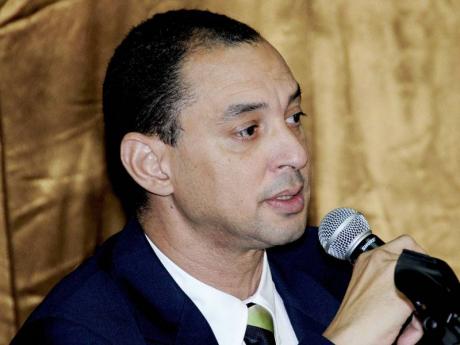Sharing cash in the public sector - Should NHT, NIF subsidise the treasury and other cash-strapped agencies under CTMS?
Avia Collinder, Business Writer
As government's finances grow more depleted, the multibillion-dollar funds overseen by cash-rich public agencies are increasingly being touted as potential revenue or financing source for the treasury and other bodies.
The suggestion appears to have as many detractors as proponents.
Donovan Perkins, president and CEO of Sagicor Investments Jamaica, says the Government could raise J$10 billion of new revenues by diverting employer National Housing Trust (NHT) contributions from the housing agency to the treasury, while the employee portions would continue to flow to the NHT.
Bruce Bowen, president and CEO of Scotia Group Jamaica, and reigning president of the Jamaica Bankers' Association, is not a fan of tapping rich agencies to infuse cash into non-performers.
To the extent that such surpluses are available, beyond what is needed to fund core functions of housing, health and pensions, he said, they would be better used to pay down the country's debt.
"By reducing debt today, the Government will have more funds available in future to improve the well-being of our citizens," the banker said.
Agencies like the NHT and the National Insurance Fund (NIF) have vast funds earning single-digit interest rates in government paper, while other entities like the Urban Development Corporation are slipping into the red and unable to find seed capital for income-earning projects.
But several private-sector leaders canvassed say that using healthy agencies to directly subsidise others would amount to supporting inefficiency.
"I do not agree that NHT and NIF funds should be passed to sister agencies to implement projects. The track record of government agencies implementing projects efficiently and effectively is poor," said Bowen.
"The Government should create the necessary environment to encourage and facilitate private-sector investment, and allow the private sector to undertake projects," he said.
Ctms to come on stream
Jamaica is now putting its new central treasury management system (CTMS) into operation.
Don Wehby, CEO of the GraceKennedy Limited, reiterated his support for the CTMS as a source of working capital support or short-term financing for government entities forced to borrow.
Wehby has previously said it is inefficient for the Government to simultaneously have cash-rich entities earning minimal interest rates and cash-strapped entities incurring huge overdraft interest rates.
He held to that view on Monday, telling the Financial Gleaner that "it makes no sense for an entity to borrow at 20 per cent or more and another to have free cash earning virtually zero per cent."
Currently, 76 per cent of the investments held by the NIF are in government paper. The pension fund holds assets totalling J$71 billion. NHT's accumulated funds were estimated at J$108 billion last year, according to finance ministry disclosures, J$78 billion of which is non-refundable employer contributions.
Leave nht, nif funds
Financial analyst Dennis Chung is in the same camp as Bowen.
"NHT and NIS are trust funds and the people of Jamaica were advised that they were for a specific purpose. To use them otherwise would be unethical," said Chung, who chairs a state agency in the process of shaking off its losses.
"These agencies have not done everything they can already and can provide more benefits," he said.
The CTMS was activated in the final quarter of 2012 with Finance Minister Dr Peter Phillips noting that overall management of public-sector finances will be taken over by the CTMS effective April 1, 2013.
The CTMS will manage all cash, government bank accounts, financial planning and forecasting of cash flows, public-debt management, administration of foreign grants and counterpart funds from international lenders and donors for the entire public sector but with the possible exception of the NIF and NHT. A central treasury account will operate out of the Bank of Jamaica.
Chung says he supports the CTMS, but says it should be managed in such a way as not to limit the ability of some to grow because of the inefficiency of others.
"For example, the JUTC could use so much cash that it kills the companies that generate the cash and so turn good operations into inefficient ones. It will need to be prudently managed else it could cripple the whole Government," he said.
Bowen says some public projects should be switched to private-sector management.
"A significant percentage of all money that flows through Jamaica's economy is paid to the Government through taxes, duties and other fees. Government should reduce the proportion of its revenues used to fund activities that can more efficiently be done by private sector, and increase the percentage used to provide support to those Jamaicans that most need help, through education, health care, security and social services," the banker said.



